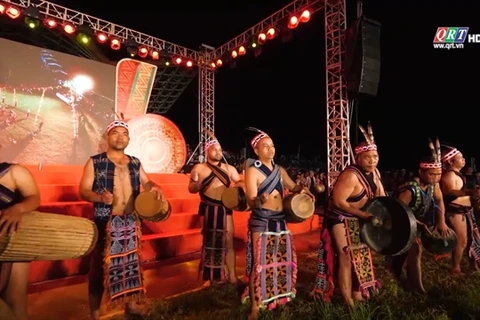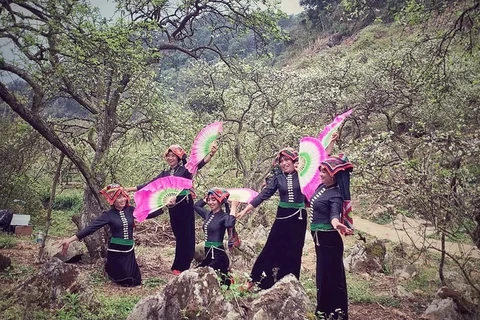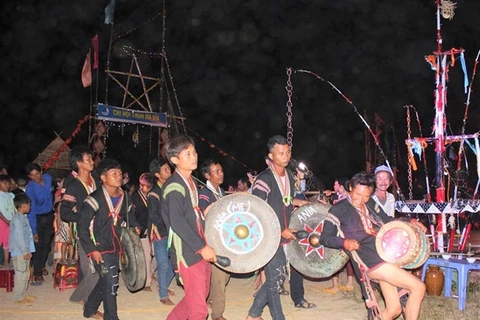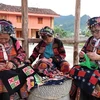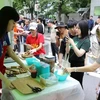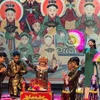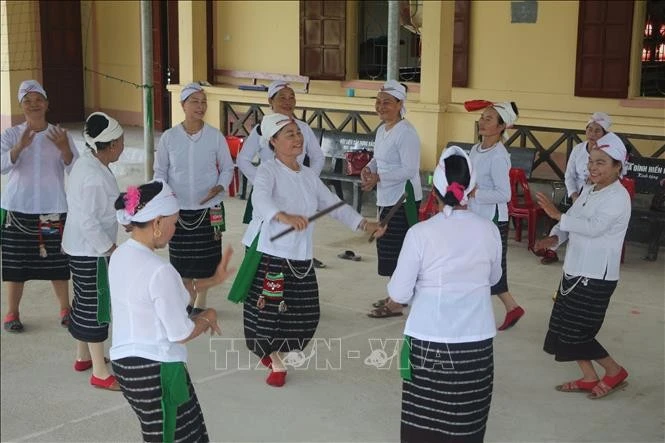
Hanoi (VNA) - The Tho ethnic group in the central province of Nghe An has long preserved the tradition of gong (traditional instrument) music, which plays a vital role in their spiritual and cultural lives, part of the rich tapestry of Vietnam's ethnic identities.
Scattered across Tan Ky, Nghia Dan, Quy Hop, and Que Phong districts, the Tho people celebrate their culture through gong performances during festivals, weddings, and funerals. This tradition has been handed down through generations within the community.
Truong Thi Thong, a member of the Long Tho Gong Club in Giai Xuan commune, said that each set of gongs is dedicated to significant cultural events. Although the Giai Xuan Gong Club was established in 2022, gatherings to play gongs, sing, dance, and weave hammocks have long been a part of local life. Club members learn together and share traditional gong melodies, often relying on oral transmission and self-teaching, she noted.
Normally, at the beginning of the Lunar New Year, locals select auspicious days to hold gong festivals, hoping to drive away evil spirits and pray for a prosperous year with good weather, bumper crops, and peace in their villages.
Despite their love for gongs, there have been long periods when community members were unable to play or celebrate with music and dance. Economic hardships led many households to sell their gongs.
Restoring ancient gong melodies has also proven challenging. Traditionally, these melodies were passed down orally, but many elderly members of the community have passed away, taking their knowledge with them and leaving behind a gap in cultural transmission.
Vu Ngoc Son, Chairman of the Giai Xuan commune People's Committee, said that the commune has over 9,000 residents, with nearly 70% belonging to the Tho ethnic group. For years, local officials have sought ways to revive the gong performance alongside economic development efforts.
Though the local government has worked to maintain traditional craft and art clubs, various factors have led to a decline in cultural values. The space for Tho cultural practices has shrunk, and traditional rituals are no longer regularly observed.
In response, the commune issued a plan in 2020 to preserve and promote key aspects of the Tho ethnic group's cultural identity in 2020-2025. The local government aims for each village to have its own set of gongs, drums, and flutes, to collect and preserve folk songs and dances, and to establish cultural clubs for practising cultural performances by 2025.
Thanks to the community's passion for gongs and the efforts of both local authorities and residents, the movement to restore the ethnic group's cultural traditions has seen positive outcomes. Gong clubs, danccing and singing groups, and hammock weaving teams have been established, conducting regular performances. Young people are encouraged to learn the art of gong playing and engage in folk singing while mobilising social resources to purchase new gongs.
The Tho people in Nghe An continue to uphold their unique cultural practices, with gong art playing a sacred role in their spiritual and cultural lives.
In the coming time, the district will encourage artisans to actively share their skills with the younger generation, bring their knowledge into books, and record videos for archival purposes, said Nguyen Van Thuc, Vice Chairman of the Tan Ky district People's Committee. It also plans to incorporate traditional gong melodies into schools and present them to tourists, he added./.
